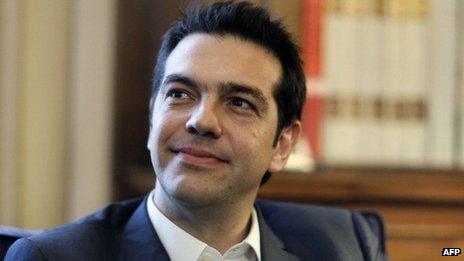Alexis Tsipras: Syriza leader 'symbol of new generation'
- Published

Alexis Tsipras is leader of the left-wing Syriza party which came second in the recent Greek election, earning widespread support for its anti-austerity message
As Greece faces the consequences of an inconclusive election, BBC Radio 4's Profile looks at the rise of the leader of the left-wing Syriza Party who rejects EU austerity plans as "null and void" and is now playing a critical role in determining the country's future.
At 37, Alexis Tsipras is Greece's youngest political leader - and a champion for Greek voters, young and old, outraged by tax rises and spending cuts.
His hard-hitting campaign in last week's election catapulted his Syriza coalition of left-wing and green parties into an unexpected second place, presenting a potentially historic opportunity for the Greek left to establish itself as one of the country's main political forces.
High school protester
Alexis Tsipras was born in Athens three days after the fall of the Greek military junta in 1974.
The junta cast a long shadow over Greek life, but the Tsipras family was not especially political, and it was the more benign shadow of the nearby Panathinaikos football stadium that dominated Alexis's life growing up in Athens - he remains a fan, attending every home game.
However, his interests were not confined to sport for long. When a new right-wing government threatened unpopular education reforms in 1991, pupils responded by taking over their schools.
17-year-old Alexis led the occupation of his high school, with pupils living, eating and sleeping in their classrooms, guarding the doors and cleaning the school for several months.
Matthew Tsimitakis, then a pupil at another Athens school, remembers meeting the young Alexis Tsipras at the height of the action.
"He struck me as very intelligent, calm, passionate but also very aware - he could represent the balance of a few hundred thousand kids who weren't very sure of what they were demonstrating about."
"I think it has something to do with the fact that he was a member of the communist youth, and was used to dealing with this kind of situation."
At the time, many young Greek students were getting involved in politics - but Mr Tsipras stood out, says Mr Tsimitakis.
"He was very well informed about what was going on in the educational system... he would negotiate with the minister and I think he was the only one who could deal with the press."
These were heady days for the teenage Alexis, experiencing his first taste of political success as the student occupation won concessions from the government - he also met the woman he planned to spend his life with, fellow student activist Betty Baziana.
A charming campaigner
After high school, he began a course at the National Technical University in Athens to study civil engineering, where the siren call of politics remained strong.
Soon, in a move that foreshadowed later political struggles, he was welding together a new coalition of radical leftist and green student groups.
After university politics came city politics. In 2006 he represented the new left-wing Syriza coalition in the Athens mayoral election. The results were impressive - against seasoned opponents, the political amateur representing a brand new party came third.
His modest, direct approach won support from party workers and the electorate, recalls Elpida Ziouva, a civil servant who works for the Athens assembly:
"No-one had a bad thing to say about him," she says. "He toured around neighbourhoods in Athens, and tried to have close contact with potential voters.
"It reminded voters of the old times when people knew politicians by their first name and they used to answer direct questions."
Just four years after entering local government, Mr Tsipras was chosen to lead the national party. At 34 years old, he was now the youngest political leader in Greece.
Over the past two years, he has repeatedly condemned government support for the Greek financial recovery plan proposed by the so-called "troika" - the European Union, the European Central Bank and the International Monetary Fund (IMF).
He has insisted cutting jobs and services is a failing policy and, as international creditors demanded more job cuts and privatisation, Mr Tsipras declared "soon they will tell us to abolish democracy".
His relaxed manner has also grabbed headlines - he chooses to cross Athens by motorbike rather than the limos favoured by other Greek political leaders, and prefers open-necked shirts to a suit and tie.
'Not honest'
Evidently, he enjoys thwarting convention - former student activist Matthew Tsimitakis recalls a presidential party a few years ago, commemorating the end of the junta's rule.

Alexis Tsipras has been accused of supporting violent protests in Greece - which he has denied.
"Alexis decided to go in a simple suit, no tie, and he was escorted by a young black woman, who was an African immigrant - that was considered a shock in conservative Greece.
"Alexis became the symbol of a new generation trying to enter a political scene which was occupied by the elders."
When the Greek people went to the polls earlier this month, the Syriza coalition won nearly 17% of the vote, confounding expectations and making Mr Tsipras the leader of the second-largest party in the Greek parliament, establishing him as a key political player.
But he is not without critics.
Some suggest he has not fully explained how his opposition to the EU's austerity plans can be squared with his support for the euro and for continuing Greece's EU membership.
Miranda Xafa, an economist and leading member of Greece's free-marketeer Drassi Party, argues that he will not admit the truth: "His message is a populist one, telling his supporters that he will put an end to austerity, and keep Greece in the euro area, which is an impossibility."
The charge is dismissed by long-time friend and Syriza party member Yiannis Bourgeois.
"That's a smear campaign. He repeatedly stated that it is not our choice to leave the eurozone."
One to watch
But there are more serious criticisms - Mr Tsipras has also been accused of supporting violent anti-austerity demonstrators, which he denies.

Can Alexis Tsipras turn his populist message into election success - and workable policies?
"He was persistent in supporting and saying that the public has the right to revolt if unfair austerity measures are imposed on them," says Dr Vassilis Monastiriotis, an expert on Greek politics at the London School of Economics.
"He didn't back off despite the fact that many people, both in the media and the political spectrum, were criticising his stance for inciting violence in the streets of Athens."
Such criticisms may explain why, when his moment came on Wednesday last week, he was unable to construct a viable coalition government for Greece.
But with a new election looking likely, one opinion poll suggests that he would emerge as the winner - commanding the largest single group of MPs. If that were to happen he could soon be negotiating at Europe's top table.
"We don't know how good a negotiator he is and how solidly he can put forward his position in the European forum where he will be talking to [German Chancellor] Angela Merkel, [French] President [Francois] Hollande and the ECB [European Central Bank]," warns Dr Monastiriotis.
But his supporters, like old friend Yiannis Bourgeois, insist that the charismatic Alexis Tsipras is a different brand of leader:
"The Greek people have had enough of the inadequate negotiators.
"You saw the results - our country is collapsing. Let's try something new."
This edition of Profile was first broadcast on BBC Radio 4 on Saturday, 12 May 2012. Listen again via the Radio 4 website or download the podcast.